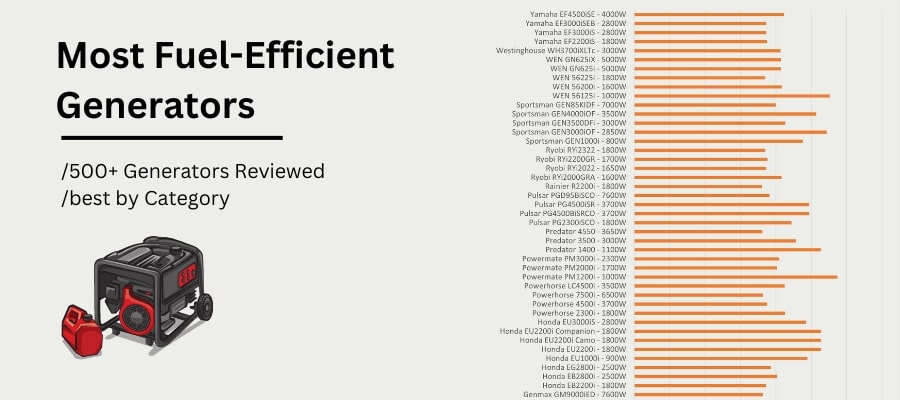
What is the most fuel efficient generator? One of the most obscure aspects of power generators is their fuel efficiency, which is only apparent when looking at their runtime at reduced power levels (often 25% or 50% of power rating) and the fuel tank capacity given alongside the generator.
After reviewing over 500+ electric portable generators (gasoline, dual fuel, Low THD, small/ large inverter generators) , we here discuss the most fuel-efficient power generators available, including efficiency on how many gallons (gas or propane) it takes to produce one kilowatt-hour of power, as well as other useful specs.
When looking for a new generator even a fuel efficient generator, there are several important things to look for, including:
- Running and Starting watt
- fuel type
- noise levels
- THD levels
Fuel efficiency is an important characteristic, and almost all manufacturers provide data in the form of runtime at specified power loads and fuel tank capacity, although they rarely indicate the specific fuel efficiency. If want to find most fuel efficient portable generator, calculate Generator fuel efficiency can be calculated using the following formula:
Fuel efficiency (gal/kWh) = Tank Capacity (in gal) / (Running Watt in kW × Time in hrs.)
The amount of fuel in gallons divided by the amount of energy produced in kilowatts times time in hrs.
Another thing when you buying most fuel efficient gas generator or most fuel efficient propane generator for home or business is If you have substantially oversized your generator and instead of running your generator at nearly full or full capacity, you’re running it at say 50% capacity well now your fuel consumption would be lower but you will have low fuel efficiency. So be sure to buy the right size generator.
Every manufacturer is different on how they provide data, most of them provide runtime @50% load while others provide @25% load.
Here is what we did to convert the data:
We compared all of the 500 generators at 50% load. We found that there is “skewed right” distribution for the difference between 50% load and 25% load and the median comes at 1.43. With this number we converter all the 25% load runtime to 50% load. Same with the propane efficiency, where median is 1.38.
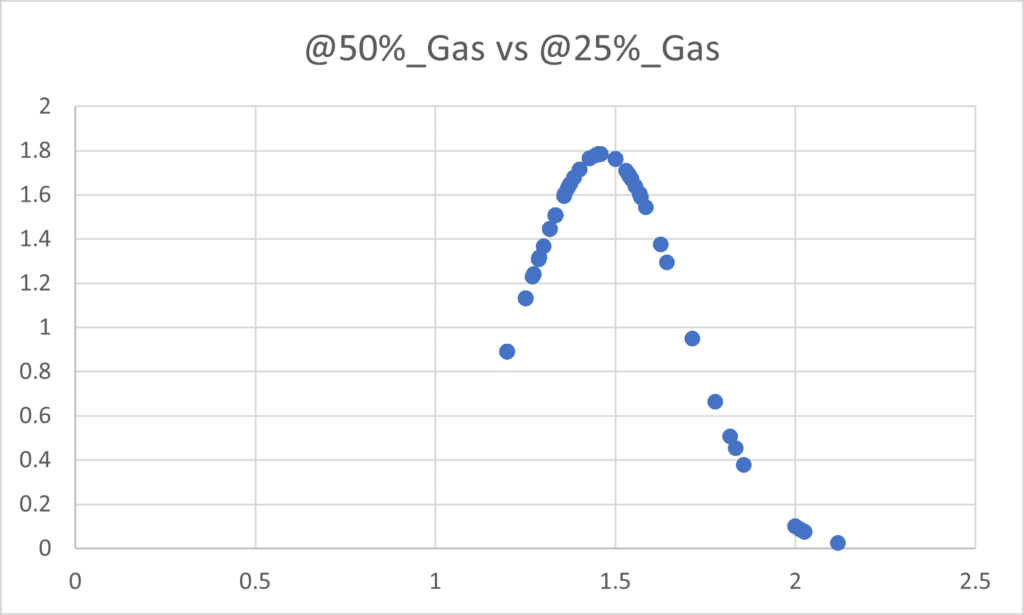
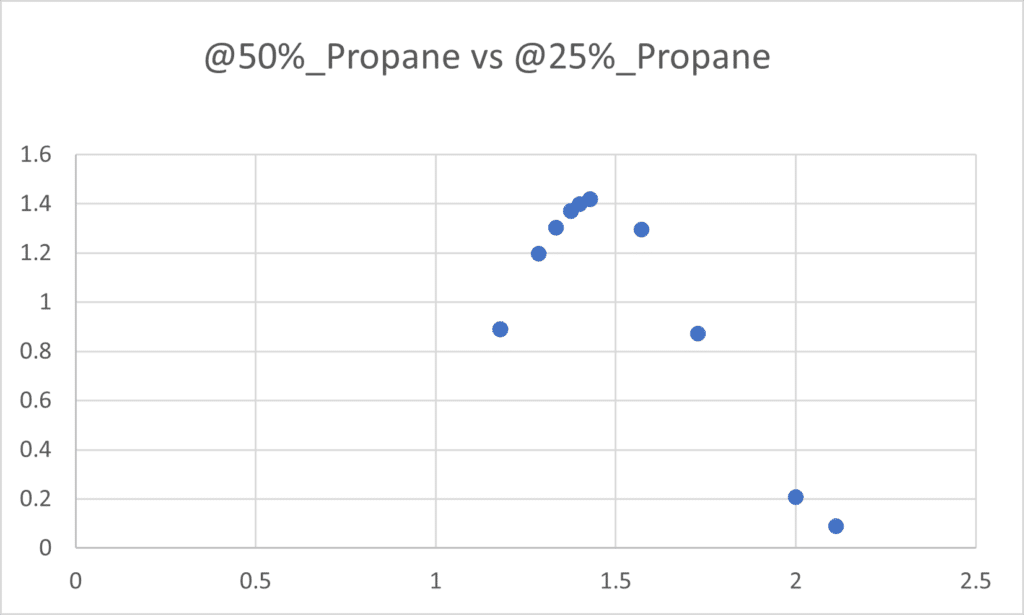
For some generators where propane runtime was not given, we used NIST 1994 GGE (Gasoline Gallon Equivalent) formula: 5.66 lbs. of propane = 1 gal of gasoline. All propane runtime is for 20 lbs. propane tank (4.7 gallons).
We also know that:
- When compared to their 4-stroke counterparts, 2-stroke internal combustion engines perform worse on fuel efficiency but are easier to operate and maintain.
- Even though most generators can run on gasoline with up to 10% ethanol, it is not often obvious if the data provided is for unleaded gas or for gas that has been diluted with ethanol.
- At low loads, inverter generators with Eco/idle control can be more efficient than non-inverter.
Certain features, such as total harmonic distortion (THD) levels (if You have to power sensitive electronics), noise levels, fuel types, etc., may be more significant to you than fuel consumption. Also have look at “what is the most efficient fuel for a generator” post.
Therefore, while shopping for most fuel efficient electric generator, specific fuel consumption shouldn’t be the only factor considered. In emergency use generators, fuel efficiency is critical, but so is having a large enough fuel tank and long enough runtime that the gas tank doesn’t need to be replenished as often.
Considering availability, return policy, ease of use, and reliability here are best fuel efficient generator for home, RV and business.**
- Most efficient all purpose gasoline generators: DuroMax XP4500iH – 3600W, WEN DF875iX – 7000W
- Most efficient propane generator: WEN 56125i – 1000W , DuroMax XP11500EH – 9000W
- Highest fuel efficiency dual fuel generator: Champion 201085 – 5500W
- Most efficient dual fuel inverter generator: WEN DF875iX – 7000W, A-iPower SUA2000iD – 1600W
- Most fuel efficient large generator: Generac GP15000E – 15000W
- Most fuel efficient small generator: Powermate PM2000 – 1400W
- Most fuel efficient RV generator: DuroMax XP5250EH – 4200W
Top 20 Best Fuel Efficient Generators- Most Economical Generator
Product Name | fuel efficiency (gal/kWh) | Running/Starting Watt (gas) | Runtime@50% (gas) | Running/Starting Watt (Propane) | fuel efficiency (gal/kWh)_Propane | Runtime@50% (propane) | noise | THD | Inverter | RV_ready |
0.264 | 1800/2,200 W | 4.0 | 48 dBA | < 3% | Yes | No | ||||
0.255 | 5500/6,875 W | 11.0 | 5000/6,250 W | 0.289 | 6.5 | 74 dBA | < 20% | No | No | |
0.253 | 5000/6,250 W | 9.0 | 74 dBA | < 20% | No | No | ||||
0.250 | 1200/1,500 W | 10.0 | 65 dBA | < 20% | No | No | ||||
0.243 | 2800/3,000 W | 10.0 | 50 dBA | < 3% | Yes | No | ||||
0.238 | 4200/5,250 W | 8.0 | 4000/5,000 W | 0.336 | 7.0 | 69 dBA | < 12% | No | Yes | |
0.231 | 9000/11,500 W | 8.0 | 8550/10,925 W | 0.366 | 3.0 | 72 dBA | < 12% | No | No | |
0.230 | 9500/12,000 W | 7.5 | 9000/11,000 W | 0.243 | 4.3 | Unknown | Unknown | No | No | |
0.229 | 3000/3,500 W | 7.7 | 56 dBA | < 5% | Yes | No | ||||
0.225 | 4000/5,000 W | 8.9 | 3800/4,750 W | 0.325 | 7.6 | 69 dBA | < 12% | No | No | |
0.213 | 3750/4,750 W | 10.0 | 67 dBA | Unknown | No | Yes | ||||
0.213 | 7500/9,500 W | 7.5 | 72 dBA | Unknown | No | Yes | ||||
0.202 | 12000/15,000 W | 9.0 | 78 dBA | < 20% | No | No | ||||
0.200 | 5000/6,500 W | 10.0 | 66 dBA | < 3% | Yes | No | ||||
0.191 | 3800/4,750 W | 11.0 | 3500/4,350 W | 0.384 | 7.0 | 69 dBA | Unknown | No | No | |
0.187 | 8300/11,000 W | 8.5 | 7500/9,500 W | 0.418 | 3.0 | Unknown | < 15% | No | No | |
0.186 | 10500/13,000 W | 8.5 | 74 dBA | < 12% | No | No | ||||
0.179 | 7000/8,750 W | 6.7 | 6300/7,800 W | 0.271 | 5.5 | Unknown | < 1.5% | Yes | Yes | |
0.169 | 6000/7,500 W | 13.0 | 72 dBA | < 23% | No | No |
Best Fuel Efficient Generators by Category
Considering availability, return policy, ease of use, and reliability here are best fuel efficient generator by category
By Size – 800 to 2000 Watts Fuel Efficient Portable Generator
Product Name | fuel efficiency (gal/kWh) | Running/Starting Watt (gas) | Runtime_hrs@50% (gas) | noise | THD | Inverter | RV_ready |
0.321 | 1400/2,000 W | 10.0 | Unknown | Unknown | No | No | |
0.264 | 1800/2,200 W | 4.0 | 48 dBA | < 3% | Yes | No | |
0.276 | 1000/1,250 W | 5.0 | 51 dBA | < 1.2% | Yes | No | |
0.250 | 1200/1,500 W | 10.0 | 65 dBA | < 20% | No | No |
Here is a comparison graph
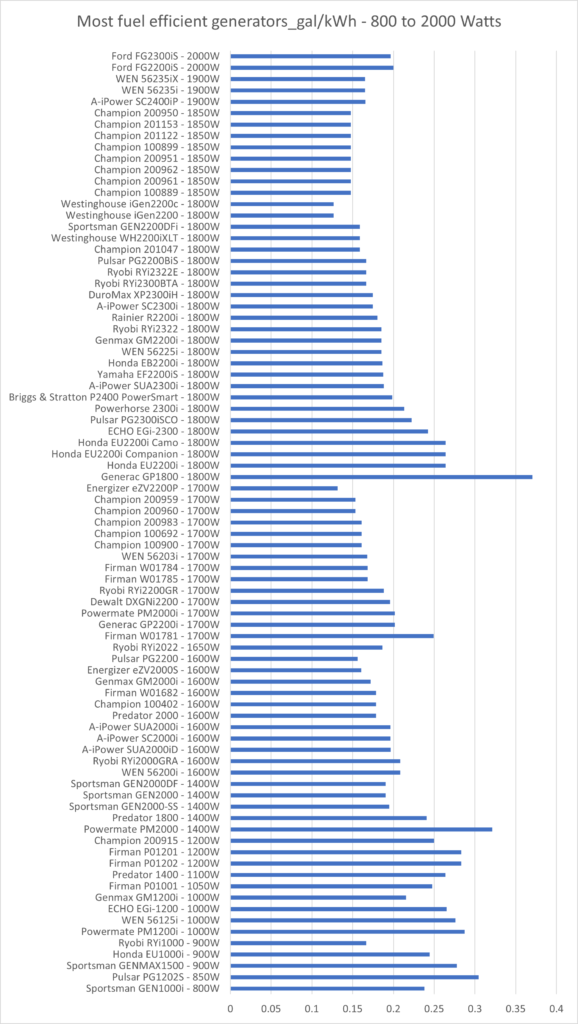
By Size – 2100 to 4000 Watts Most Fuel Efficient Portable Generators
Product Name | fuel efficiency (gal/kWh) | Running/Starting Watt (gas) | Runtime@50% (gas) | Running/StartingW(Propane) | fuel efficiency (gal/kWh)_Propane | Runtime@50% (propane) | noise | THD | Inverter | RV_ready |
0.213 | 3750/4,750 W | 10.0 | 67 dBA | Unknown | No | Yes | ||||
0.225 | 4000/5,000 W | 8.9 | 3800/4,750 W | 0.325 | 7.6 | 69 dBA | < 12% | No | No | |
0.243 | 2800/3,000 W | 10.0 | 50 dBA | < 3% | Yes | No | ||||
0.212 | 4000/4,500 W | 10.6 | 58 dBA | < 3% | Yes | No | ||||
0.229 | 3000/3,500 W | 7.7 | 56 dBA | < 5% | Yes | No | ||||
0.221 | 3600/4,500 W | 9.3 | Unknown | < 25% | No | No |
Here is a comparison graph
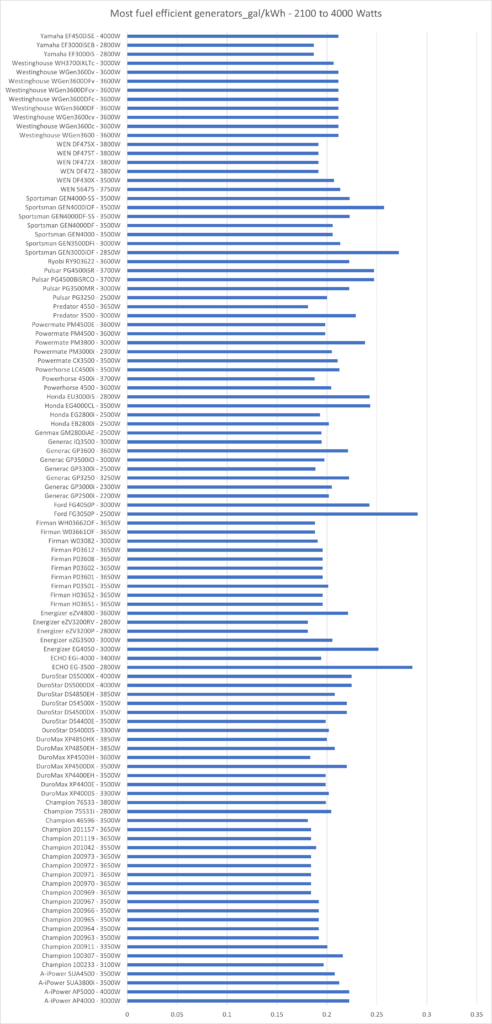
By Size – 4100 to 6000 Watts Most Energy Efficient Generator
Product Name | fuel efficiency (gal/kWh) | Running/Starting Watt (gas) | Runtime@50% (gas) | Running/Starting Watt (Propane) | fuel efficiency (gal/kWh)_Propane | Runtime@50% (propane) | noise | THD | Inverter | RV_ready |
0.230 | 5500/6,500 W | 9.8 | 64 dBA | < 10% | No | No | ||||
0.253 | 5000/6,250 W | 9.0 | 74 dBA | < 20% | No | No | ||||
0.200 | 5000/6,500 W | 10.0 | 66 dBA | < 3% | Yes | No | ||||
0.234 | 5700/7,125 W | 12.0 | 5700/7,125 W | 0.330 | 5.0 | 74 dBA | < 25% | No | No | |
0.169 | 6000/7,500 W | 13.0 | 72 dBA | < 23% | No | No |
Here is a comparison graph
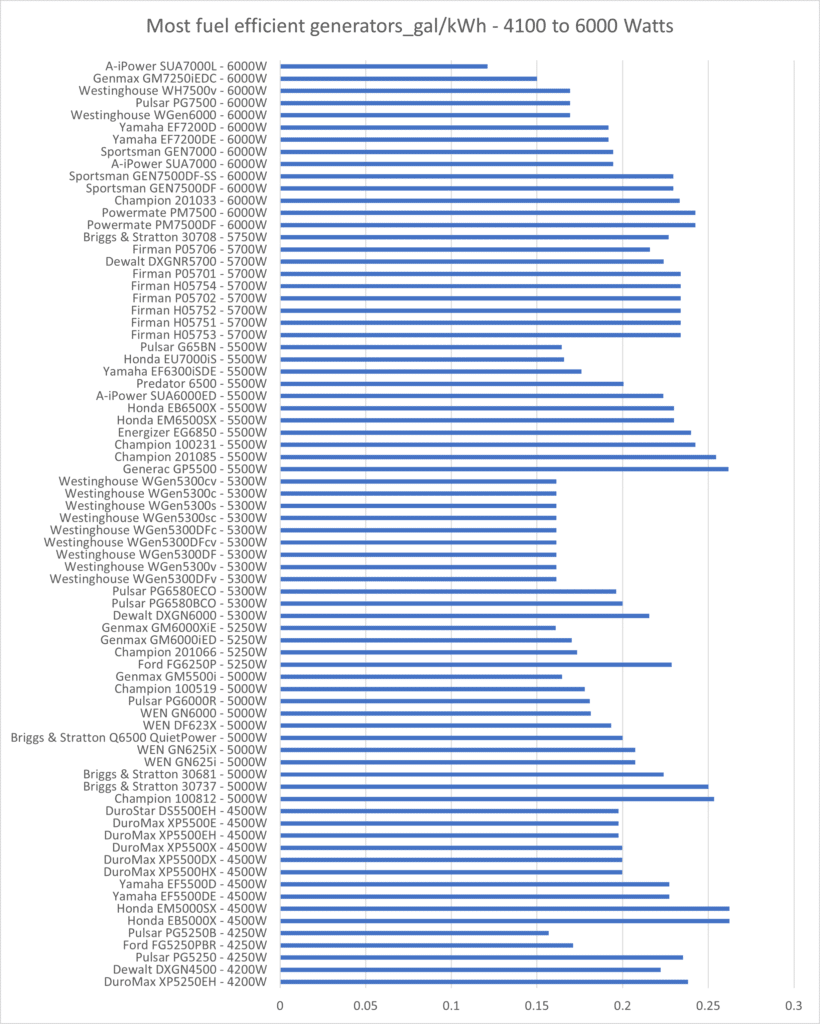
By Size – 6100 to 8000 Watts Fuel Efficient Portable Generators
Product Name | fuel efficiency (gal/kWh) | Running/Starting Watt (gas) | Runtime@50% (gas) | Running/Starting Watt (Propane) | fuel efficiency (gal/kWh)_Propane | Runtime@50% (propane) | noise | THD | Inverter | RV_ready |
0.208 | 8000/10,000 W | 10.0 | 6800/8,500 W | 0.346 | 4.0 | 72 dBA | < 12% | No | No | |
0.213 | 7500/9,500 W | 7.5 | 72 dBA | Unknown | No | Yes | ||||
0.208 | 8000/10,000 W | 10.0 | 72 dBA | < 12% | No | No |
Here is a comparison graph
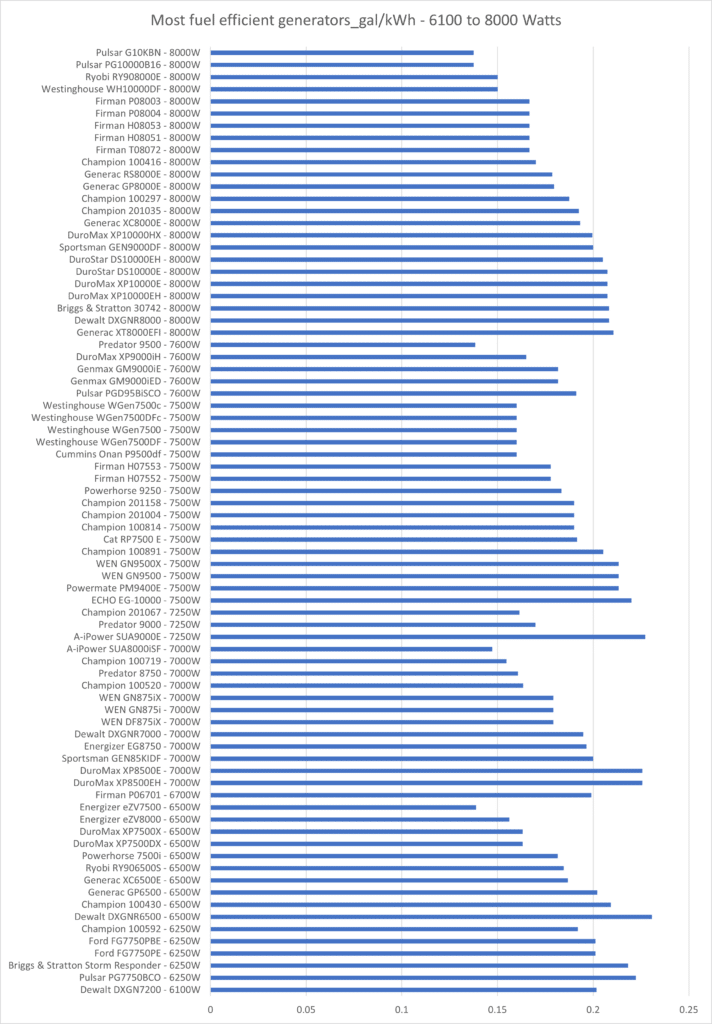
By Size – 8100 to 10000 Watts Most Fuel-Efficient Generators
Product Name | fuel efficiency (gal/kWh) | Running/Starting Watt (gas) | Runtime@50% (gas) | Running/Starting Watt (Propane) | fuel efficiency (gal/kWh)_Propane | Runtime@50% (propane) | noise | THD | Inverter | RV_ready |
0.230 | 9500/12,000 W | 7.5 | 9000/11,000 W | 0.243 | 4.3 | Unknown | Unknown | No | No | |
0.231 | 9000/11,500 W | 8.0 | 8550/10,925 W | 0.366 | 3.0 | 72 dBA | < 12% | No | No | |
0.218 | 9500/12,000 W | 8.0 | 8750/10,500 W | 0.269 | 4.0 | 74 dBA | < 12% | No | No |
Here is a comparison graph
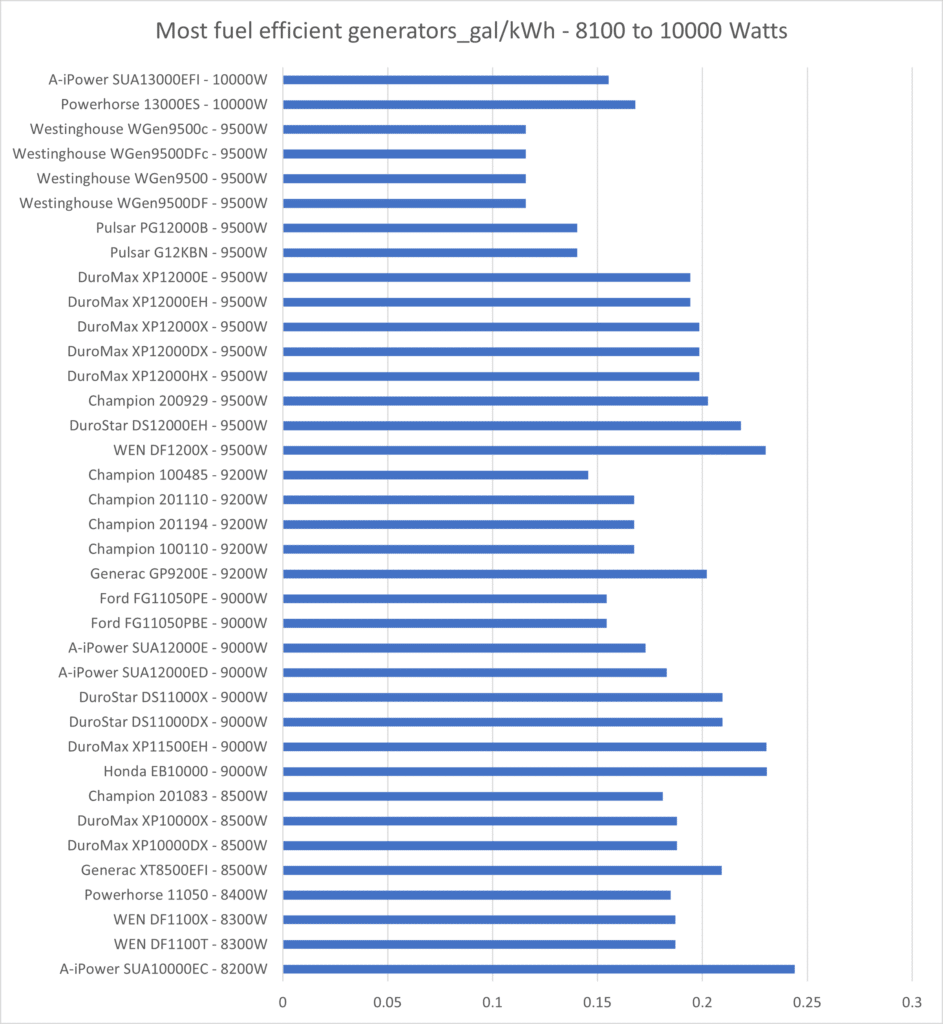
By Size – 10100 to 20000 Watts High Fuel Efficiency Generators
Product Name | fuel efficiency (gal/kWh) | Running/Starting Watt (gas) | Runtime@50% (gas) | Running/Starting Watt (Propane) | fuel efficiency (gal/kWh)_Propane | Runtime@50% (propane) | noise | THD | Inverter | RV_ready |
0.213 | 15000/22,500 W | 10.0 | Unknown | < 20% | No | No | ||||
0.202 | 12000/15,000 W | 9.0 | 78 dBA | < 20% | No | No | ||||
0.186 | 10500/13,000 W | 8.5 | 74 dBA | < 12% | No | No |
Here is a comparison graph
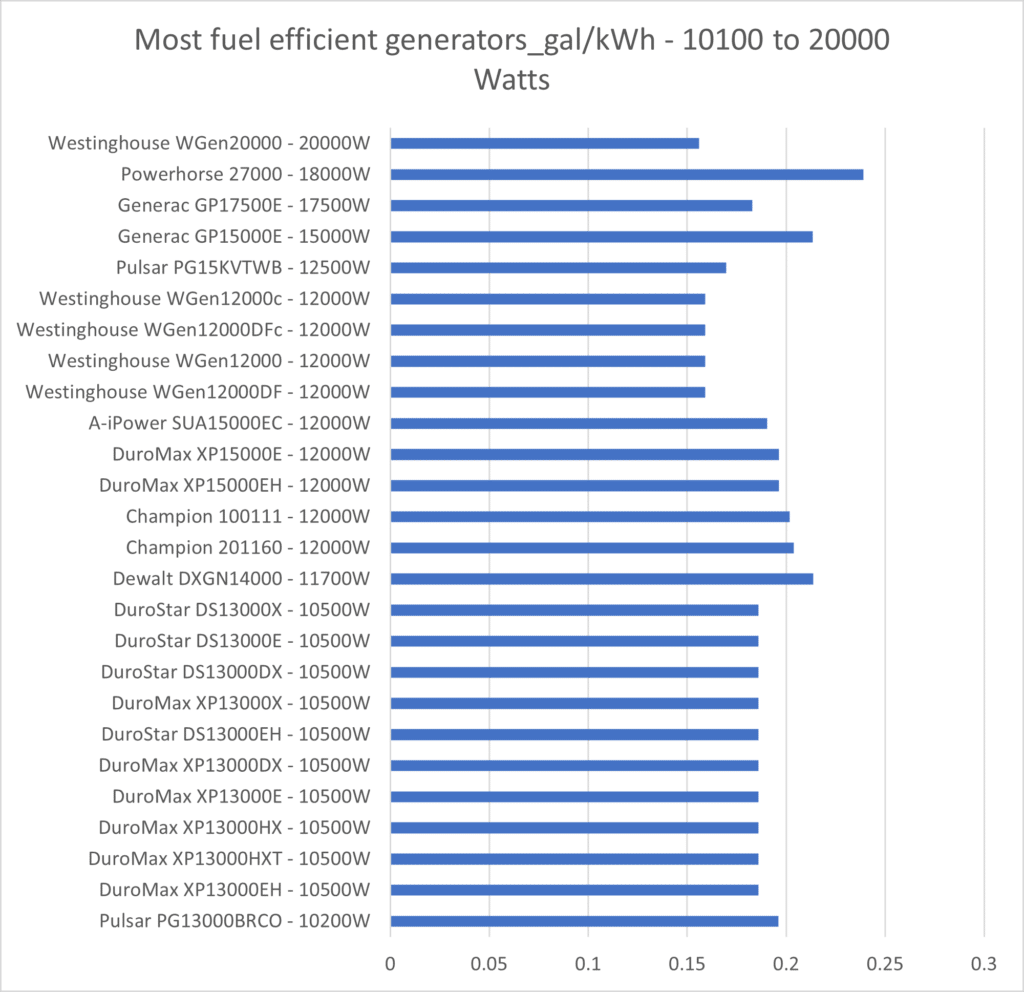
Efficient Propane or Dual Fuel Generators
Product Name | fuel efficiency (gal/kWh) | Running/Starting Watt (gas) | Runtime@50% (gas) | Running/Starting Watt (Propane) | fuel efficiency (gal/kWh)_Propane | Runtime@50% (propane) | noise | THD | Inverter | RV_ready |
0.179 | 1600/2,000 W | 7.7 | 1440/1,800 W | 0.375 | 17.4 | 53 dBA | < 3% | Yes | No | |
0.197 | 1600/2,000 W | 7.0 | 1500/1,800 W | 0.288 | 21.7 | 52 dBA | < 3% | Yes | No | |
0.183 | 3600/4,500 W | 8.0 | 3420/4,275 W | 0.250 | 11.0 | 65 dBA | < 3% | Yes | Yes | |
0.191 | 3800/4,750 W | 11.0 | 3500/4,350 W | 0.384 | 7.0 | 69 dBA | Unknown | No | No | |
0.179 | 7000/8,750 W | 6.7 | 6300/7,800 W | 0.271 | 5.5 | Unknown | < 1.5% | Yes | Yes | |
0.231 | 9000/11,500 W | 8.0 | 8550/10,925 W | 0.366 | 3.0 | 72 dBA | < 12% | No | No | |
0.187 | 8300/11,000 W | 8.5 | 7500/9,500 W | 0.418 | 3.0 | Unknown | < 15% | No | No | |
0.242 | 5500/6,900 W | 9.0 | 5000/6,250 W | 0.289 | 6.5 | 74 dBA | < 20% | No | No | |
0.255 | 5500/6,875 W | 11.0 | 5000/6,250 W | 0.289 | 6.5 | 74 dBA | < 20% | No | No | |
0.230 | 9500/12,000 W | 7.5 | 9000/11,000 W | 0.243 | 4.3 | Unknown | Unknown | No | No |
Here is a comparison graph
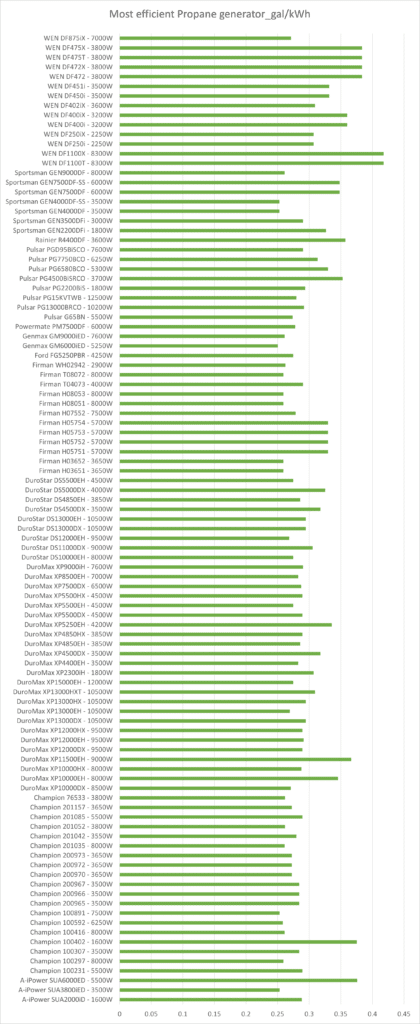
Most Fuel Efficient Inverter Generators
Product Name | fuel efficiency (gal/kWh) | Running/Starting Watt (gas) | Runtime@50% (gas) | Running/Starting Watt (Propane) | fuel efficiency (gal/kWh)_Propane | Runtime@50% (propane) | noise | THD | Inverter | RV_ready |
0.179 | 1600/2,000 W | 7.7 | 1440/1,800 W | 0.375 | 17.4 | 53 dBA | < 3% | Yes | No | |
0.197 | 1600/2,000 W | 7 | 1500/1,800 W | 0.288 | 21.7 | 52 dBA | < 3% | Yes | No | |
0.183 | 3600/4,500 W | 8 | 3420/4,275 W | 0.25 | 11 | 65 dBA | < 3% | Yes | Yes | |
0.191 | 3800/4,750 W | 11 | 3500/4,350 W | 0.384 | 7 | 69 dBA | Unknown | No | No | |
0.179 | 7000/8,750 W | 6.7 | 6300/7,800 W | 0.271 | 5.5 | Unknown | < 1.5% | Yes | Yes | |
0.231 | 9000/11,500 W | 8 | 8550/10,925 W | 0.366 | 3 | 72 dBA | < 12% | No | No | |
0.187 | 8300/11,000 W | 8.5 | 7500/9,500 W | 0.418 | 3 | Unknown | < 15% | No | No | |
0.242 | 5500/6,900 W | 9 | 5000/6,250 W | 0.289 | 6.5 | 74 dBA | < 20% | No | No | |
0.255 | 5500/6,875 W | 11 | 5000/6,250 W | 0.289 | 6.5 | 74 dBA | < 20% | No | No | |
0.23 | 9500/12,000 W | 7.5 | 9000/11,000 W | 0.243 | 4.3 | Unknown | Unknown | No | No |
Here is a comparison graph
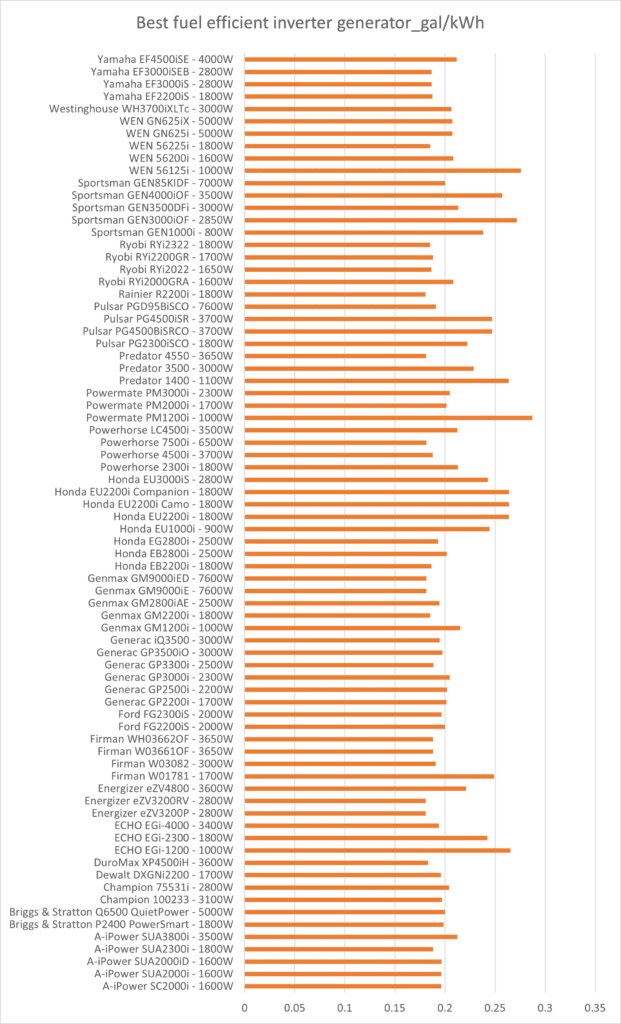
**In contrast to many other sites, we thoroughly investigated each of the aforementioned parameters. However, we are human and are therefore capable of the unexpected oversight or mistake. Please let us know if you see any missing or erroneous values, since this will help us fix the problem.
